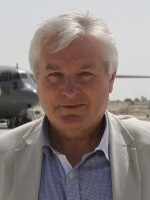RENEE MONTAGNE, host:
Although this is not a great time to be going around the world asking for cash but that's what Pakistan's new president, Asif Ali Zardari, is doing. He's just been to Saudi Arabia looking for a way out of an economic crisis that's threatening his already deeply unstable nation. His government is seeking help from the International Monetary Fund as well. This report from NPR's South Asia correspondent Philip Reese.
PHILIP REEVES: If you want to get a sense of how tough it is to be poor and old in Pakistan, study Muhammad Bashir's face. His eyes are hollow. His cheeks are gaunt. Deep worry lines etch his brow. He's so thin he looks endanger of being swallowed up by his shirt. Muhammad Bashir(ph) is 70 years old. He used to be a tailor. He's too infirm to work now. He's come to this vegetable market in Pakistan's capital of Islamabad to find out what he can afford to buy. The answer is not much.
Mr. MUHAMMAD BASHIR( (70-year-old Pakistani): (Urdu Spoken)
REEVES: Bashir says food prices are out of control, yet he says no one seems to be doing anything about it. Just when it seemed things couldn't get much worse in Pakistan, they have. Barely a day passes without a suicide bombing or a battle between government forces and the Taliban fighting for control over Pakistan's northwest. Nearly nine months after it was elected, Pakistan's coalition government still struggling to find its feet and the economy's unraveling. Tariq Fatemi is a former ambassador to Washington.
Mr. TARIQ FATEMI (Former Pakistani Ambassador to the United States): There is absolutely no doubt the president, the prime minister, the finance minister - they have all stated so not once but on a number of occasions that the country faces a serious economic crisis.
REEVES: Two years ago Pakistan's economy was going along at a healthy clip. Growth was close to seven percent. Conflict and political turmoil have inflicted a heavy toll and so has the global financial crisis. Inflation's risen above 27 percent. With foreign exchange reserves running low, Pakistan's in danger of soon being unable to pay for its imports. Pakistan buys most of its crude oil from Saudi Arabia. This week, Pakistan's President Zardari asked the Saudis to defer crude oil payments. His hosts made positive noises but no agreements being made public. Even if there is one, Pakistan may well have to be bailed out by the International Monetary Fund. Zardari says this is the last option but there've already been preliminary talks. Tariq Fatemi believes there's no choice and that the terms will likely be painful.
Mr. FATEMI: The administration and the establishment will have to cut down its expenditure. The elected people who wanted money so that they could spread around political patronage will have to do without it.
Mr. ABID Q. SULERI (Economist, Pakistan Sustainable Development Policy Institute): Ultimately I don't see any other solution to this problem and that they will have to go to IMF at any case.
REEVES: That's Abid Suleri, an economist with Pakistan's Sustainable Development Policy Institute. Pakistan's currency, the rupee, has lost 30 percent against the dollar since the start of this year. Suleri says that's hitting the poll because it's contributed to painful rises in the price of crucial imported staples, for instance, wheat and cooking oil.
Mr. SULERI: Similarly in case of medicine and Pakistan has been relying on imported medicines to a great extent and their prices, they have gone up.
REEVES: The big worry is that Pakistan's economic crisis will lead to popular unrest and hardened support for Islamist militants. Suleri says that's why the world has no alternative but to help out.
Mr. SULERI: Because it's not in their interest to have a destabilized Pakistan as it is said that a stable Afghanistan is a must for a stable Pakistan, and a stable Pakistan is must for the rest of the world.
REEVES: Philip Reeves, NPR News.
MONTAGNE: And that story was compiled with some reporting help from Junaid Kahn(ph) in Islamabad. Transcript provided by NPR, Copyright NPR.







